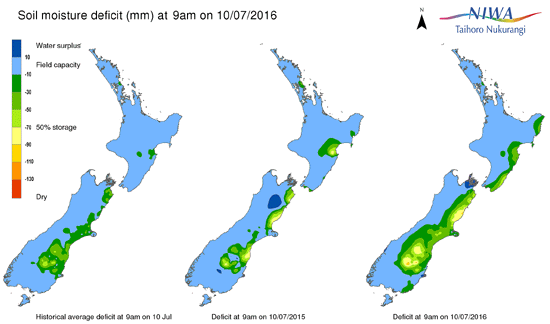
Here are the key things you need to know before you leave work today.
TODAY'S MORTGAGE RATE CHANGES
The NZ Anglican Church has reduced its 1-year fixed rate mortgage by 5bps to 4.15% for amounts over $100,000.
SBS has announced some rate changes effective from Monday 11 July. The bank is increasing its standard floating rate by 10bps to 5.69%, introducing a new 4-year special fixed rate of 4.90% (subject to minimum equity requirements) and cutting its 3-year fixed rate by 10bps to 4.55%.
TODAY'S DEPOSIT RATE CHANGES
No changes today.
'THE ECONOMY CLEARLY DOES NOT NEED MORE STIMULI'
ANZ has changed tack, saying it now believes the RBNZ will keep interest rates on hold at its next review in August. The call comes after RBNZ Deputy Governor Grant Spencer yesterday talked of plans to introduce further LVR restrictions, but surprised markets by not yet pinning anything down for definite. ANZ chief economist Cameron Bagrie says: "Housing is booming so much that it is becoming a financial stability threat; you can’t divorce that from monetary policy and throw more fuel on the fire by cutting the OCR. Macroprudential policy tweaks have been flagged, but not until much later on (the end of the year)."
HIGH HOUSING COSTS DRIVE INFLATION
ANZ's Monthly Inflation Gauge rose 0.3% in June - more than usual for this time of year - off the back of higher construction, property maintenance services and electricity costs. Taking housing out of the equation, prices rose 0.2% m/m, the largest rise since January 2014. ANZ says: "Domestic inflation looks to be past its lows with rising pressures from obvious sectors such as housing. Time will tell whether the lift outside of housing is monthly noise or substance."
KEY: 'GET ON WITH IT'
Prime Minister John Key has once again passed the buck onto the RBNZ to put out the housing crisis fire. Speaking to Stuff.co.nz today, he expressed further frustration about the RBNZ's response to rising house prices, saying it shouldn't need any more time to investigate stricter rules for property investors. "I stand by what I said [on Wednesday], I think they should get on with it," Key said. Spencer last night made his own dig at the Government, saying it needs to take another look at its immigration and tax policies.
AN END TO THE HOUSING BOOM IS IN SIGHT...
BNZ's Tony Alexander has put his neck out and declared when the housing boom will end. His pick is for between late 2017 and mid 2018. Alexander believes the end of the boom would likely be caused by several factors, including the end of falling interest rates which would be replaced by worries about rising interest rates, slowing net inward migration, increased supply of housing and restricted bank lending to investors.
RENTS RISING
Rental data released today shows the national median weekly rent is now $400. In Auckland a 3-bedroom house will set you back $628 per week while the equivalent property in Wellington and Christchurch costs $529 & $433 resepctively. The only category to see a fall in rents was for 2-bedroom flats in Christchurch. Rents in Auckland for both 3 bedroom houses and 2-bedroom flats are at their highest points.
NO REPRIEVE FOR AUST MINING SLUMP
Australia has cut its 2016 price forecast for the country's biggest export earner - iron ore - by nearly 2% to well under current prices. Australia's Department of Industry, Innovation and Science now sees iron ore averaging US$44.20 a tonne this year, versus a US$45 forecast in March and a US$40.40 forecast in December. The forecast comes amid a rally in iron ore prices this year, with prices jumping almost 30% year-to-date. Yet supply is still outstripping demand, largely due to slowing growth in China.
TOURISTS FLOCK TO OTAGO
Otago has been dubbed the country's fastest growing region when it comes to tourism. The Government's Monthly Regional Tourism Estimates show tourism expenditure in the region increased by 10% in the year to May, to $3.2 billion. Expenditure was up an estimated 9% to $295 million in Nelson and 8% to $6.7 billion in Auckland. Gisborne is the country's only region that didn't benefit from a tourism boost.
FLETCHER BUILDING BEEFS UP
Fletcher Building is moving into the road construction and maintenence space. It's received Commerce Commission clearance to acquire Higgins Group's road surfacing and maintenance, civil structure and construction products businesses. Higgins’ has not sold its ready mix concrete business and property businesses.
SWAP RATES RISE
A combination of the US 10-year treasury rate bouncing off its recent low and Grant Spencer's speech last night have culminated in a strong rise in NZ swap rates today. The short end of the curve is up between 5 to 7bps, the middle up 6ps and the long end up 5bps. Today's swap rate movement keeps the 1-5-year yield curve in negative territory. Our NZ swap rate charts are here. The 90-day bank bill rate is unchanged at 2.42%.
NZ DOLLAR HIGHER AGAIN
The Kiwi has continued to trade higher after Spencer's speech. The rally has been broad based with substantial gains made against the safe haven USD & JPY. The NZD/USD is currently at 72.69c, the NZD/AUD at 96.88 and the TWI-5 is 76.28. Check our real-time charts here.

You can now see an animation of this chart. Click on it, or click here.
Daily exchange rates
Select chart tabs
9 Comments
"In Auckland a 3-bedroom house will set you back $628 per week "
That's not just ridiculous, that's criminal.
Who's to blame??
(JK have a look in the mirror)
And Len Brown
And ever councillor in power in auckland from about 2003 to today
A combination of the US 10-year treasury rate bouncing off its recent low and Grant Spencer's speech last night have culminated in a strong rise in NZ swap rates today.
Five-year yields are 1.04 percentage points higher in New Zealand than they are in the U.S., providing the biggest premium since June 27. Australia’s bond yields are 65 basis points greater than Treasuries. Read more
It is an article of orthodox faith that low interest rates mean “stimulus” and success, but history is proving yet again otherwise. Read more
The OCR is now a minor influence on house prices.
If the real economy needs a cut then the RB may as well deliver.
Weird how we have a global recession, NZ farmers and SMEs struggling, wage earners flatlining, Govt spending capped or diminishing in education/health etc, yet a runaway Auckland housing bubble, while most products & services are in deflation.
It's not "weird" MB, it's deliberate due to house/land price inflation having no actual input into the CPI. Thus then bank profits are continuous 'boom or bust', peoples essential living costs continue to climb also regardless thus people are forced into work regardless of wages...etc etc.
"Wage slavery" they call it.
Worthless central bankers endlessly repeating rising forward inflation claims that are constantly without corroborating fact have to be challenged by our political representatives, if not ourselves.
European Central Bank vice president expects inflation in the euro area to ‘normalize’ over the next few years
But here is the kicker.
In the wake of the U.K. vote, investors have sold off European bank stocks, particularly those in Italy. In response, Italian officials have said that the government hopes to inject as much as €40 billion, or about $44.3 billion, in fresh capital into domestic banks.
But such a move likely would spark opposition in Brussels, Berlin and other EU capitals. Under new EU rules that came into force in January, no public money can be used to support failed banks until private-sector creditors accounting for 8% of the liabilities have been bailed in.
While Mr. Constâncio said that the bail-in rules have “of course to be applied,” he added that they “should be considered in [their] entirety, including the possible use of the exemption for financial stability reasons, at the national or European levels.” Read more
The continuing saga of the collapse of the EU is starting to gather pace. It seems to me that the world has adopted a bunch of policies, ideas and practices that never worked well but were arguably useful for a time, and set them in institutional concrete. As the years go by they make our societies less and less functional as they encourage more and more misallocation of capital.
The EU is a fine example of this process at play. Those who have benefited get increasingly paniced at the prospect of change and cling more and more desperately to their disfunctional ideas. Trouble is, if you ignore their interests for long enough, then eventually the masses kick down the palace gates and slaughter those inside.
The OCR is now a minor influence on house prices.
I totally disagree - lower asset funding service costs allow investors/speculators to pull greater values of future returns forward to be capitalised today.

We welcome your comments below. If you are not already registered, please register to comment
Remember we welcome robust, respectful and insightful debate. We don't welcome abusive or defamatory comments and will de-register those repeatedly making such comments. Our current comment policy is here.